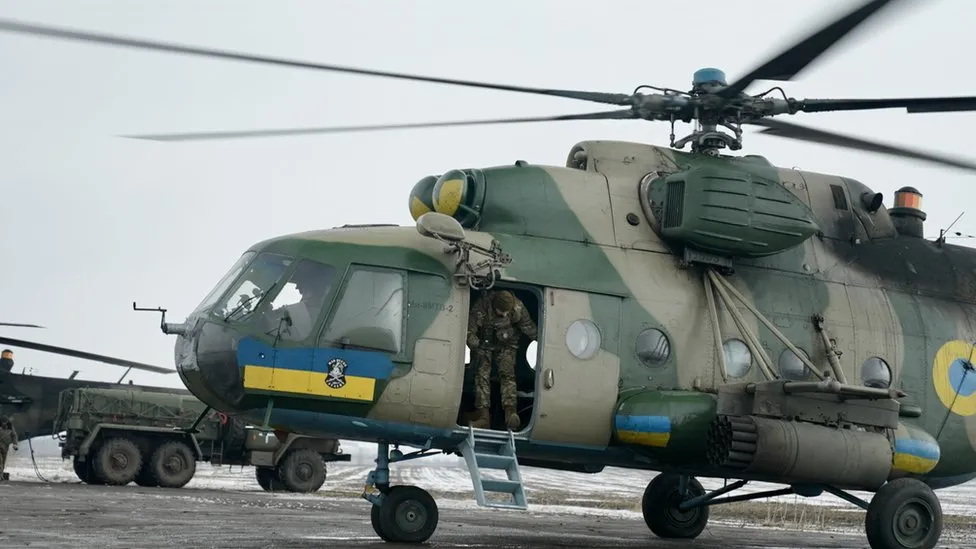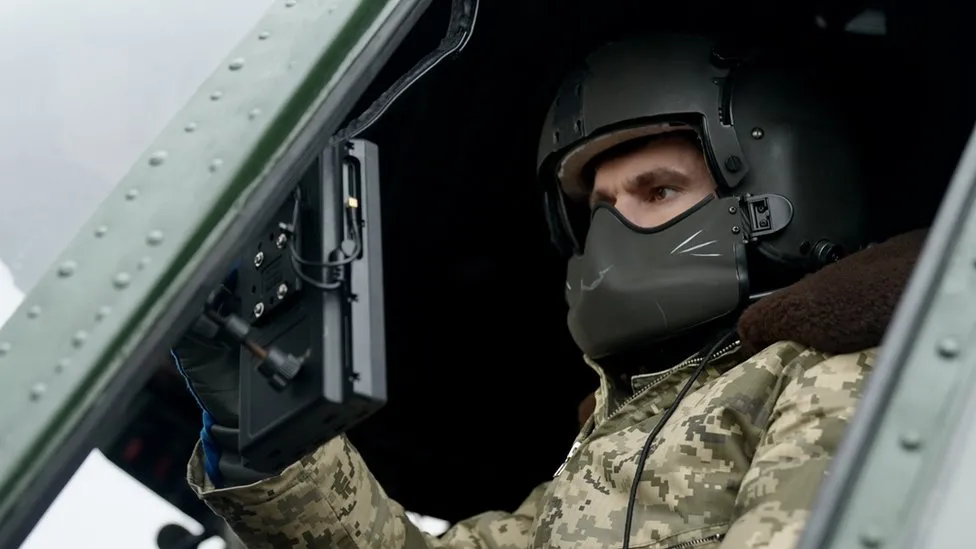Ukraine war: The renowned airman fighting from a low-flying helicopter
The best way to come back alive is to stay low, hugging the ground, and skimming the treetops. Too low and you can be shot down by machine gun fire - too high and you can be detected by enemy air defence systems.
For helicopter pilots in war-time Ukraine, there is little margin for error.
Just ask Roman.
He has flown countless combat missions for Ukraine's Sikorsky Brigade and been decorated for valour. He tells us his age - 34 - but not his last name.
"The closer to the target, the lower we fly. It's one or two metres above ground," he tells the BBC. "It's not enough just to strike the target. You have to come back safe and bring your crew and helicopter back safely for the next mission."
Over the past year some of his fellow pilots have not made it back.
We were given rare access to Ukraine's war in the skies at an air strip on a patch of open ground. We can't say where it is - if Russia could identify the location, it would be a major target.
We watch Roman take off for his latest sortie on Ukraine's eastern front with our camera in the cockpit. His helicopter is followed by two others; their blades slice the air beneath a muddy grey sky.
Below them a Ukrainian trench zigzags across the landscape, and a village lies deserted.
They speed across a frozen lake as if skating on ice. Half an hour later they return, having unleashed 80 missiles.
Roman comes in to land circling low enough over our heads for us to see him wave from the window. He's renowned among fellow airmen in his brigade for executing difficult manoeuvres - a Ukrainian top gun in an ageing Soviet aircraft.
His Mi-8 helicopter is about as old as he is, and lacks heavy armour, or modern warning systems about incoming missiles. Every mission could be his last.
"Of course, there is some risk," he says after touching down. "I just don't think about this. If it happens, it will not be my problem, it will be a problem for my relatives". It sounds like a joke, but his expression is concealed by his balaclava.
He will not disclose his target, but chances are it was close to the eastern city of Bakhmut - which the Russians are battling to encircle.
"It was just an ordinary mission. You concentrate 100% on your task," he says. "You think of your guys waiting for you on the ground. They are really striving if they call for aviation."
What he doesn't think about is the Russian troops on the receiving end.
"If they came here with war," he tells me, "we are just protecting our country. We are not aggressors. We are the victim. And if to win this war we should kill Russian soldiers, we are ready to kill them all."
As soon as the helicopters land, maintenance crews converge, refuelling and rearming the aircraft to be ready for the next flight.
The missiles are loaded by hand. One is inscribed with a crude message to Russian troops.
Within minutes Roman has co-ordinates for a new target and is wheels up again.
He says Ukraine can't win this war with the Soviet equipment it's got.
A spokesman for his brigade spells it out.
"We need new helicopters with navigation equipment, high precision weapons and ammunition," he tells us. "We need everything."
Add this to the fighter jets already requested by President Volodymyr Zelensky, and it's a long list for what may be a long war.
When Russian President Vladimir Putin invaded last year, Roman was part of a Ukrainian peacekeeping mission in the Democratic Republic of Congo. Now this former peacekeeper sees a danger of endless conflict with Russia.
"Just look back at our history," he says. "We have always had problems with our neighbour. When we win this one if they don't change, they will come back to attack us again, in years or in decades."
https://www.bbc.com/news/world-europe-64779505






Post a Comment